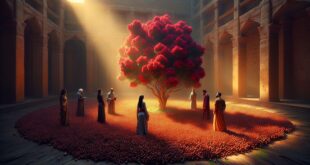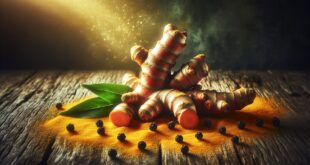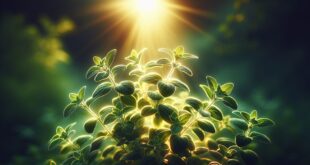 From the bustling marketplaces of ancient Byzantium to the tranquil gardens of Chinese emperors, the quest for sharper minds and healthier brains has been a pursuit as old as civilization itself. Long before the term “herbal nootropics” was coined, wise sages and healers wielded the power of plants to enhance cognitive function and promote overall brain health. They were like modern-day neuroscientists, except their labs were nature’s bounty, and their results were recorded in scrolls and stories passed around campfires.
From the bustling marketplaces of ancient Byzantium to the tranquil gardens of Chinese emperors, the quest for sharper minds and healthier brains has been a pursuit as old as civilization itself. Long before the term “herbal nootropics” was coined, wise sages and healers wielded the power of plants to enhance cognitive function and promote overall brain health. They were like modern-day neuroscientists, except their labs were nature’s bounty, and their results were recorded in scrolls and stories passed around campfires.
In Egypt, home to some of the earliest medical texts we know of, priests would use Bacopa Monnieri, a succulent with small white flowers, as a revered staple in the pharmacological toolkit. It wasn’t just about treating ailments; it was about nurturing the divine spark of intelligence. Meanwhile, across the Mediterranean, the Greeks were sipping on brews of rosemary—believing it was a gift from Aphrodite herself that could sharpen memory and wit. Even the great philosopher and physician, Hippocrates, sang its praises as part of his holistic view of health.
Shifting our gaze to the East, the Indians and Chinese have long intertwined spirituality with wellness. Ayurveda, a tradition rich with ancient wisdom, boasts a treasure trove of brain tonics. Gotu Kola and Ashwagandha were more than herbs—they were symbols of life’s interconnectedness, a bridge between body and mind. The Chinese, too, with their rich history of herbal medicine, were steadfast in their use of herbs like ginkgo biloba to promote clear thinking and longevity. They understood that a balanced life is not just about flowing through the daily grind but embracing nature’s rhythms.
Interestingly, modern science has begun to validate what our ancestors inherently knew. Studies have shown that many of these herbs genuinely bolster brain function and reduce cognitive decline. This silent communion between past and present shows that while our languages, cultures, and technologies have evolved, our basic needs remain ever so beautifully similar.
So, when we reflect on these traditions, a simple truth emerges: ancient brain tonics remind us of a time when medicine was part art, part science. These time-honored practices aren’t relics of a bygone era—they’re timeless threads that weave together our shared human heritage. As the poet Rumi eloquently put it, “Don’t grieve. Anything you lose comes round in another form.” Maybe he wasn’t talking about brain tonics, but the sentiment rings true. In the cycle of life, valuable knowledge never truly fades; it just waits for the next seeker to rediscover it.
Herbs scientifically proven to boost cognition
Modern science often seems like the new kid uncovering secrets that ancient wisdom knew all along. You ever wonder how society reconnects with nature to enhance cognition? Let’s roll up our sleeves and dig into the dirt—figuratively speaking—to explore some herbs that have someone whispering their virtues in research papers and family kitchens alike.
For starters, there’s Bacopa Monnieri. With its unassuming façade of tiny white flowers, it doesn’t scream “brain powerhouse” at first glance. Yet, this plant, cherished in Ayurveda, is a superstar when it comes to cognitive prowess. Studies have shown its potential to improve memory and attention, helmed by compounds like bacosides. It’s been said, “Nature does not hurry, yet everything is accomplished”—are we surprised that something innate to the Earth holds such a quiet power?
Then, take Ginkgo Biloba, a relic from the age of dinosaurs, as ancient as the rocks it grows among. Long valued in Chinese medicine, this herb is believed to boost brain health by increasing blood flow and acting as an antioxidant. Clinical trials present evidence to back it up, showing improvement in speed and quality of cognition in certain populations. But does modernization dilute the potency of these herbal nootropics? It’s the ever-present debate, isn’t it?
Walking along this path of natural wonders, you’ll also meet Rhodiola Rosea. Emerging from the chill of Siberian soil, this robust flower holds promise as a stress-buster and mental fatigue limousine. Recent studies highlight its adaptogenic qualities, helping the mind and body adjust to stress. Stress—it’s like trying to hold water with your hands; it always finds a way through unless given perspective. Isn’t the idea of resilience in our biology comforting?
Ashwagandha, another ancient gem, works like Mother Earth’s gentle reminder to balance vigor and calm. Revered for reducing anxiety and enhancing energy, it’s a cornerstone in Ayurvedic practices. NCBI acknowledges its impact, too, hinting at lowered cortisol levels—a marker of stress—and improved cognitive function. Consider this the botanical equivalent of a deep, calming breath.
But where do these revelations leave us? They beckon us to pause, to blend the old with the new, creating harmony in cultivating our well-being. It’s not just about gulping down a supplement with your morning coffee but embracing the whispers from those before us, merging ancient wisdom with our today.
In this dance between plants and people, a quote from Albert Einstein might resonate: “Look deep into nature, and then you will understand everything better.” Perhaps the smallest leaf in our garden holds the wisdom our brains quietly yearn for. There’s an entire world from earth to sky, intertwining roots and thoughts, waiting patiently for us to join the circle—where stories of past traditions find echoes in scientific truths.
Reflecting on these herbs, the journey seems less about finding ‘the next big thing’ and more about rediscovering nature’s timeless gifts—finding that sweet spot where heritage meets health. In the end, isn’t that what we’re all after—a connection deep and fulfilling?
How to incorporate ancient remedies into modern routine
 Incorporating ancient remedies into your day-to-day routine doesn’t have to be daunting. In fact, it might just be a return to simplicity, a homecoming of sorts. Picture your morning routine, a sacred ritual of preparation for the day. Why not infuse it with a dash of ancient wisdom? Mixing a teaspoon of Bacopa Monnieri powder into your morning tea or coffee is like adding a gentle nudge of brain health right where you need it. The serenity it brings might remind you of sitting by a quiet stream—calming yet invigorating.
Incorporating ancient remedies into your day-to-day routine doesn’t have to be daunting. In fact, it might just be a return to simplicity, a homecoming of sorts. Picture your morning routine, a sacred ritual of preparation for the day. Why not infuse it with a dash of ancient wisdom? Mixing a teaspoon of Bacopa Monnieri powder into your morning tea or coffee is like adding a gentle nudge of brain health right where you need it. The serenity it brings might remind you of sitting by a quiet stream—calming yet invigorating.
For those who tend to be on-the-go, consider keeping a small container of ginkgo biloba capsules in your bag. They require no effort and travel well—perfect for the days when you feel your mental energy waning. Think of it as a portable whisper from the ancients, converging the past with the present in every capsule, linking your intent to a tradition of healing and clarity. Convenient, thoughtful, and seamlessly integrated into the hustle of modern life.
Supplementing with ashwagandha in the form of powder or capsules can also be a grounding practice. Consider adding this potent adaptogen into your evening routine. Stir it into warm milk for a soothing nightcap—it’s akin to the ancient ritual of winding down the day’s energies positively. As you sip, you might reflect on how our ancestors found sustenance and peace in nature’s rhythms, and how you’re bringing those age-old practices back into your world.
If you’re more of a kitchen alchemist, preparing a weekly tonic using a mix of rhodiola rosea, fresh mint, and raw honey might just become your cherished pastime. Brew the herbs slowly, let their scents weave through your living space, infusing your environment with serenity and intention. Every sip becomes a meditation, a moment to pause and acknowledge the circle of life that bridges ancient roots with your personal narrative.
These old-world remedies seamlessly merge with modern routines. They don’t demand upheaval; rather, they suggest a gentle folding in—a return to the holistic view our ancestors revered. Patterns of consumption shift from mindless to mindful, from quick-fix to sustained well-being. What does it mean to honor the past this way? It means embracing the wisdom they offer us, like a grandparent thoughtfully passing down a cherished heirloom.
Consider exploring trusted sources when obtaining these herbs—providers who appreciate the lineage of their products. Sites like American Herbalists Guild offer insights into ethically-sourced herbs, ensuring quality and trust in your holistic journey. Supporting resources like these enhance our understanding and respect for these treasures as tools of self-care and connection rather than mere trends or passing fancies.
This practice isn’t just about mixing herbs into your routine but about tending to an inner garden. It involves sowing seeds of awareness, patience, and reverence for those who’ve walked before us and shown the way. As you weave the ancient with the current, perhaps you’ll find moments of subtle transformation; like a gentle awakening to possibilities unseen. Could there be a more enriching way to navigate the tapestry of life?
Ultimately, learning to welcome ancient herbal nootropics into your daily life is about creating spaces for these quiet conversations between past wisdom and our modern journeys. It’s more than brain health—it’s an affirmation of our connection to the earth and our shared history. And in this genuinely human ritual lies a beautifully simple truth: sometimes, the path forward is grounded in the wisdom of where we began.
 DS Haven In Light Of Things
DS Haven In Light Of Things






